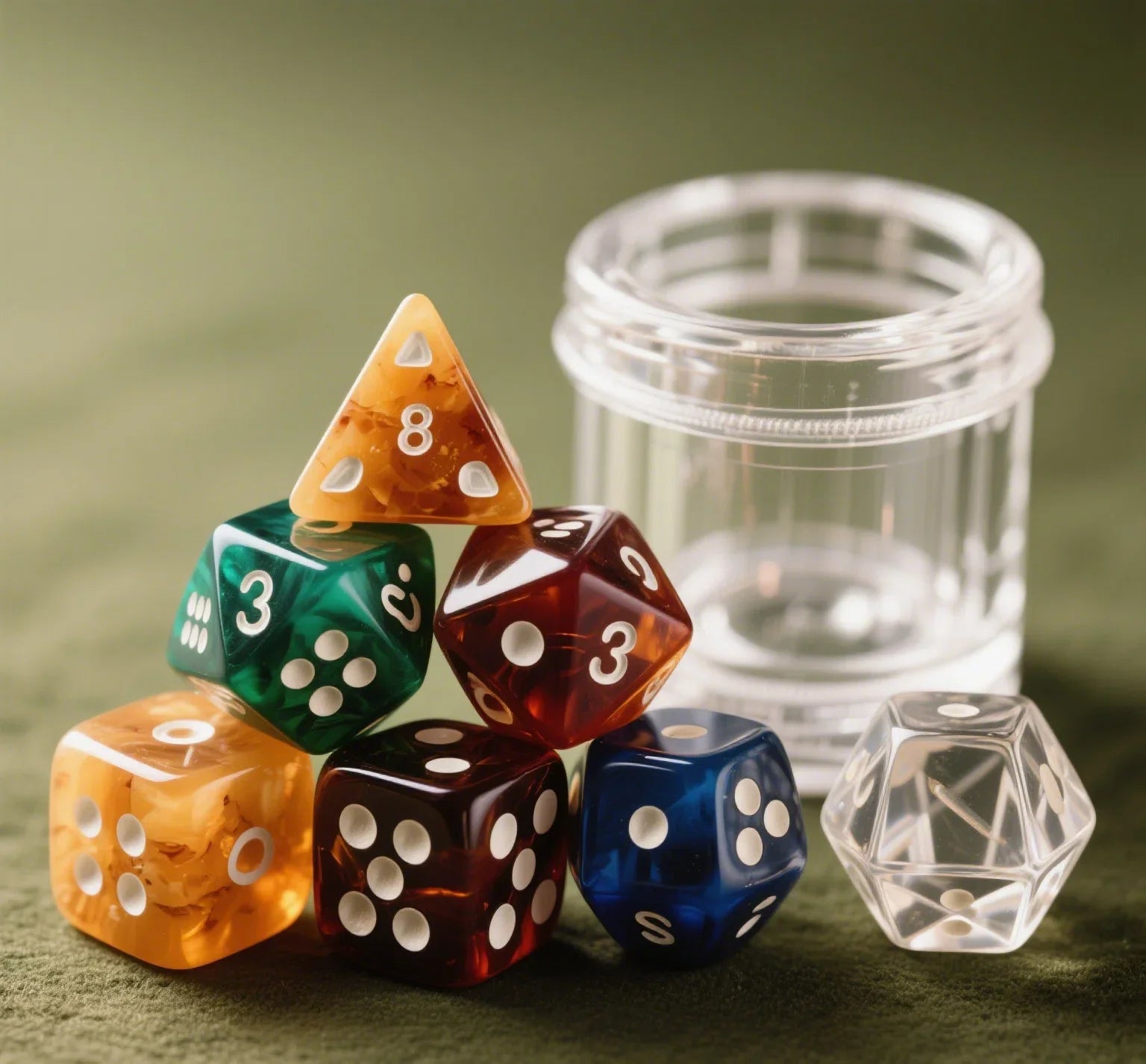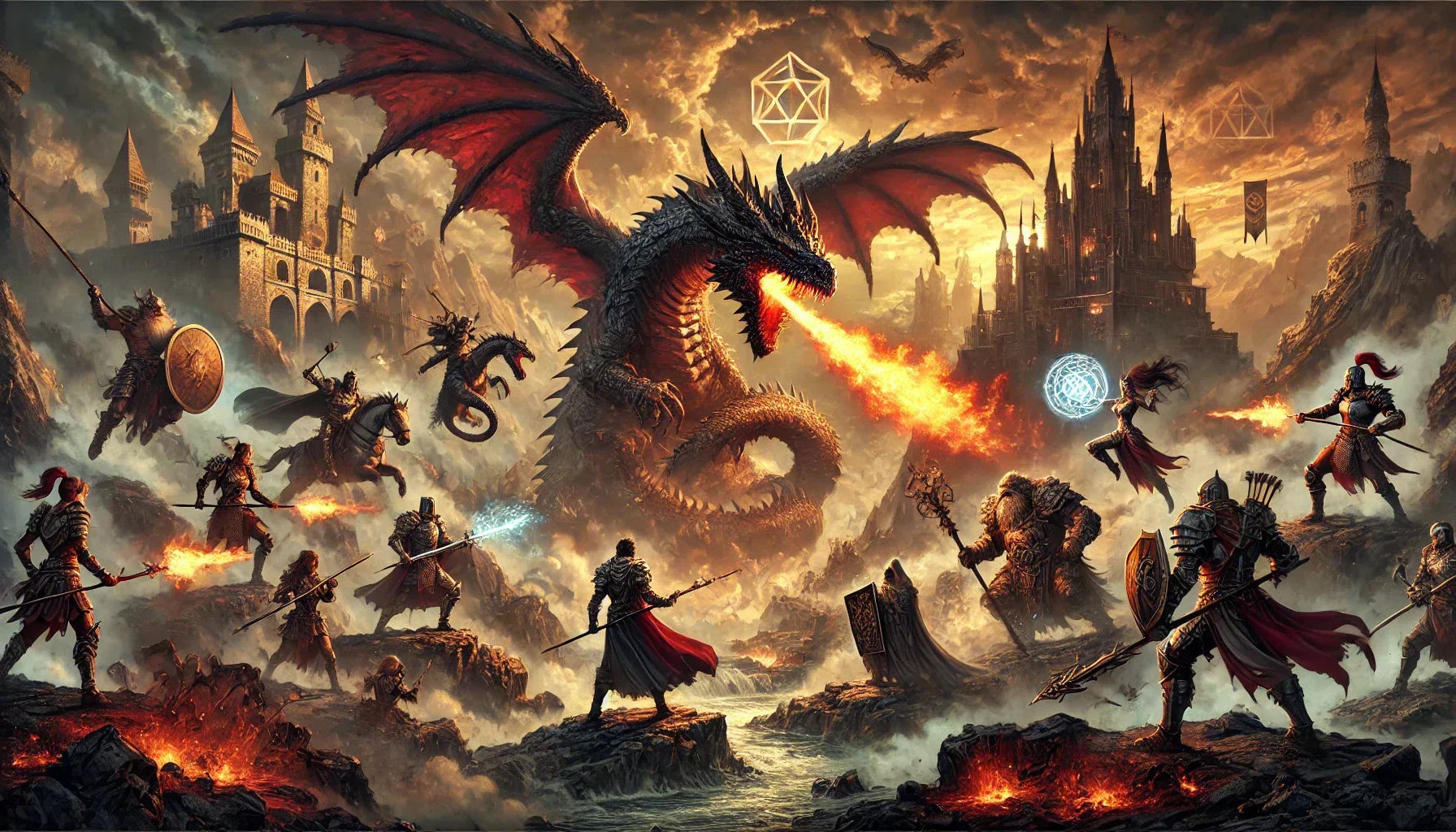TTRPG (Tabletop Role-Playing Game) is the abbreviation of tabletop role-playing game, representing classic tabletop game systems such as Dungeons & Dragons and Pathfinder. In these games, you will play a role and work with your teammates to advance the plot by rolling dice, telling stories, and completing tasks.
But when you first enter Dungeons & Dragons or other TTRPG games, you are often confused by a bunch of inexplicable terms? HP, AC, RP, DC... Looks like code, but it is actually the "universal language" in role-playing games!
This article is your exclusive tabletop role-playing game terminology. Whether you are playing DND, Pathfinder, or other TTRPG systems, this novice vocabulary list can help you understand what old players are saying and get started quickly!
✨Full interpretation of common TTRPG abbreviations
| Abbreviation | Meaning | Examples |
|---|---|---|
| HP | Hit Points | When HP=0, the character falls to the ground or dies. For example, you are burned by 20 HP by the fireball. |
| AC | Armor Class | Armor level, the enemy attack must "roll the dice" to exceed this value to hit you. |
| DC | Difficulty Class | To succeed or fail to do something, you must "roll the dice" against this value. |
| XP | Experience Points | Used to upgrade the character's growth value. |
| RP | Roleplay | Speak and act from the character's perspective. |
| NPC | Non-Player Character | Non-player characters, controlled by the DM. |
| PC | Player Character | The behavior of playing a role, such as speaking in the tone of your character. |
| DM | Dungeon Master | Dungeon Master, also called GM (Game Master), host and narrator. |
| AoE | Area of Effect | Attack multiple enemies, such as fireball. |
| D20 | 20-sided Dice | The most commonly used dice in TTRPG. Every action is inseparable from it. |
| RAW | Rules As Written | Explained completely according to the official rules |
| RNG | Random Number Generator | Refers to the system in the game that determines luck by rolling the dice. |
| TPK | Total Party Kill | Team wipe, all player characters are killed... |
| Meta | Meta-Gaming | Players make decisions based on information that the characters should not know (usually discouraged). |
| CR | Challenge Rating | Used to measure the strength of monsters. |
| PP | Passive Perception | No need to roll dice, automatically perceive the value of things. |
✅ Tips: These terms frequently appear in Reddit, Discord, or DND communities. Familiarity with them can help you integrate into the team faster!
Class and Skill Vocabulary (Class & Skill) Newbies can understand it at a glance!
In DND or most TTRPG systems, the gameplay of each character is defined by "class" and "skills":
| RPG Classes | Introduction to the role characteristics |
|---|---|
| Fighter | Melee expert, tank or output, suitable for beginners |
| Wizard | Long-range casting, high burst, many spells but fragile |
| Rogue | High agility, good at stealth, sneak attack and unlocking traps |
| Cleric | Healing support, sacred spells, can fight and heal |
| Paladin | Warrior blessed by holy light, can fight and resist, with sacred spells |
| Barbarian | Violent output type, resistant to beating, strong explosive power |
| Ranger | Archer/wilderness survival expert, often with pets |
| Druid | Natural spells, can transform into animals |
| Sorcerer | Spells come from bloodline, flexible casting but fewer spells |
| Warlock | Sign a contract with a mysterious existence to obtain unique spell abilities |
| Bard | Versatile, good at assistance, performance, socializing and casting |
| Monk | Flexible body movements, good at unarmed combat and evasion |
| Artificer | Technology + magic mixed profession, can create magic items (modern/steampunk style setting) |
Characters need to perform skill checks to complete specific tasks, such as stealth, persuasion, trap removal, etc. These skills are usually linked to the character's attributes (such as agility, perception, intelligence, etc.).
| Skill | Use scenarios |
|---|---|
| Stealth | Use to sneak up on enemies, hide and avoid |
| Perception | Detect hidden enemies, traps or details |
| Investigation | Find clues, solve puzzles |
| Arcana | Understand magic and mysterious things |
| History | Identify ancient relics, remember the background of events |
| Insight | See if NPCs are lying or hiding emotions |
| Persuasion | Negotiate, negotiate and ask for help from NPCs |
| Deception | Deceive NPCs, disguise identities, etc. |
| Intimidation | Get information or concessions by intimidation |
| Athletics | Physical movements such as climbing, swimming, jumping, and wrestling |
| Acrobatics | Flexible movements such as balance, rolling, and dodging |
| Survival | Find the way, track, and identify plants and animals |
| Medicine | Judge injuries and stabilize dying characters |
| Religion | Understand religious backgrounds such as gods, sacred objects, and rituals |
| Animal Handling | Calm, control or interact with animals |
| Nature | Understand weather, geography, knowledge of plants and animals |
| Sleight of Hand | Stealing, magic performances, light operations |
👉 Recommended dice: If you want to enhance the ritual of "skill check", you can try our unique giant D20 dice, which not only feels good, but also looks good. It's especially cool when you roll a "20-point big success"!
⚔️Battle-related terms
The battle phase is the "highlight moment" in TTRPG, but it may also be the most complicated part. Understand these common terms first, so that you don't become a "beating machine".
- Initiative (first attack value): determines the order of your shots in battle, usually rolling D20 plus agility.
- Attack Roll (attack check): Use D20 dice to roll, the result must be greater than or equal to the enemy's AC to hit.
- Damage Roll (damage roll): After hitting, roll the damage dice to determine the damage value caused by this attack.
- Saving Throw: Used to resist certain spells, control or trap effects, such as fireball or paralysis.
- Critical Hit: Usually roll 20 points (natural 20), causing double damage!
- AOE: Area of Effect, an attack that can affect multiple targets, such as fireball.
Actual combat example:
Your wizard casts a fireball (DC 15), and the enemy performs a Dexterity Saving Throw. Two goblins fail to roll the dice and are directly blown away, and one rolls 20 points - successfully avoided!
Game system related terms
| Terminology | Meaning |
|---|---|
| Cantrip | Permanent spells, do not consume spell slots, can be used unlimited times. The main output of mages and warlocks. |
| Spell Slot | Used to cast "leveled" spells. The number is limited every day, and you can only rest and replenish them after using them up. |
| Long Rest / Short Rest | Long rest / short rest. The way a character recovers life, spell slots or skills, affecting resource management strategies. |
| Homebrew | Content created by players or DMs (characters, items, plots, and even the entire world view). Unofficial but very common. |
| One-shot | One-time plots, usually short groups that can be completed in one night, suitable for novices to try out or friends to have fun together. |
| Campaign | Long-term groups usually run multiple chapters or tasks in a row to tell a more complete story. |
Brief introduction to dice types: Dice for TTRPG you need to know
In tabletop RPG, there is more than just D20! Dice of various numbers of sides have their own functions:
| Dice Type | Abbreviations | Common Uses |
|---|---|---|
| D4 | 4-sided dice | Low-level spell damage, such as Magic Missile. |
| D6 | 6-sided dice | Commonly used for normal attacks, fireballs, etc. |
| D8 | 8-sided dice | For weapon damage or healing spells. |
| D10 | 10-sided dice | For warrior skills, spells, etc. |
| D12 | 12-sided dice | For powerful attacks, only for warriors. |
| D20 | 20-sided dice | The key dice to determine success or failure. |
| D100 | 100-sided dice | For random event tables or mechanisms such as "critical failure". |
🎁 Tips for purchasing dice: New players are recommended to buy [DND 7-piece set] which contains all the above dice to easily deal with various scenarios.
TTRPG practical dialogue example
| Scene | Player quotes | DM responds |
|---|---|---|
| Sneak into the enemy camp | "I use Stealth to get close to the guard." | "Roll a Stealth check." |
| Negotiate with NPC | "I want to use Persuasion to convince him to give us the map." | "Roll Persuasion, DC 15." |
| Battle begins | "I use Fireball to attack the goblins!" | "They do a Dex Saving Throw, what's the DC?" |
| Encounter a trap | "I use Perception to see if there are any traps ahead." | "Okay, roll Perception." |
The rhythm of the game revolves around "describing actions → rolling dice → determining results". These terms are "bridges" that allow players and DMs to communicate without obstacles, so that the story can unfold smoothly.
💡 Tip: Terms are tools, not obstacles
Newcomers often feel that "you need to understand a lot of terms to play", but in fact, the essence of TTRPG lies in "storytelling + rolling dice". Terms are just a way to make communication more efficient-it doesn't matter if you don't understand, just follow the DM and have fun!
If you want to know more [dice knowledge, role-playing strategies, TTRPG gameplay suggestions]? Welcome to subscribe to our blog or leave a message below about what you want to know most!
Recommended extended reading
👉 DND dice guide: How to choose your first set of adventure dice?
👉 Metal vs resin dice, which one is more suitable for your character?



